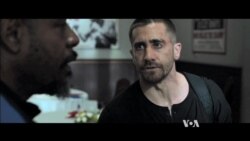Since the 1930s, Hollywood has produced more than 150 boxing films in which the main character is the underdog, who triumphs over a fierce opponent or where the champ loses everything because of his reckless lifestyle. Southpaw, by filmmaker Antoine Fuqua, the latest installment in the boxing genre, deviates from the traditional narrative by pitting the heavyweight champion in an existential fight against himself.
The movie opens with a boxing sequence. The light heavyweight contender Billy Hope is pummeling his opponent. His anger drives him and consumes him at the same time. His wife is watching in dismay at her husband's blodied face. She is his confidant, his manager, his driving force.
After the match, she warns him that there is a limit to the punches a boxer can take before they take a toll on his health and life. But Billy does not listen. He is a husband and a father but a boxer first.
He is at the top of his game, until a fateful evening, when at a charity event Billy's main opponent provokes him, insulting his wife. Tempers flare, a gun goes off and Maureen Hope, Billy's wife, is lying dazed on the floor, her life waning away. Soon, she is gone.
From that moment on, Billy's life goes haywire. Thinking of revenge he carries a loaded weapon, drinks heavily and smashes his car. His little girl finds him almost unconcious and armed. She calls 911. The court finds him unfit to be a parent and revokes his boxing license. His money dries up and he loses everything. HIs daughter is taken into foster care.
After a series of violent outbursts, Billy realizes that he has to quell his anger to win his title and his daughter back. With the help of an obscure trainer, played by Forest Whitaker, he learns to fight with technique, not raw anger.
The camera follows Billy Hope's grueling training, but the difference here is the close attention to Billy's laser sharp focus and moves. They require coolheadedness and discipline, two newly found attributes for Billy, who has to use the fight to end all fights against his bitter opponent who caused his wife's death.
Jake Gyllenhaal delivers a tour de force performance as an outwardly warm and loving man with uncontrollable bursts of anger.
“Underneath anger is vulnerability, some kind of hurt" says Gyllenhaal. "I think that’s what Billy shows somewhere: Is what he’s able to face through a series of life circumstances that are unfortunate, but that he learns from and I think he comes out a real man and has the ability to be a father as a result of that.”
For five months before and during the shoot, Gyllenhaal sparred twice a day with filmmaker Antoine Fuqua, a boxer himself.
“I didn’t want to ask him to do something that hard that I couldn’t do myself, still right now in my age that I could still do," he said. "So, I told Jake, I’ll do it with you. We'll crank up the music and we’ll go onto the journey together from the beginning to the end.”
Southpaw is filmed in gritty documentary style, with boxing closeups and fast-paced boxing sequences. It looks like an HBO special. The audience can feel every punch, and almost smell the blood.
The acting is heart-rending without being corny. Young Oona Laurence, who plays Billy’s young daughter, is an old soul in a little girl’s body. She is the driving force behind Billy’s journey, while Forest Whitaker, Billy’s trainer, is his moral compass.
Oscar-winning movies such as Raging Bull, Rocky, Million Dollar Baby and The Fighter are hard acts to follow. But Southpaw holds its own as the psychological drama of a fighter down the rabbit hole. In the world of boxing, a southpaw is a boxer who fights with his right hand and right foot forward.
Billy does the opposite. The title is not about him, but about his greatest opponent, the man in the mirror, who has to learn self-discipline and focus to reclaim his title and his family.





